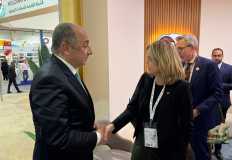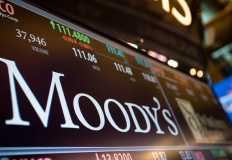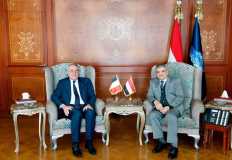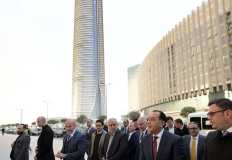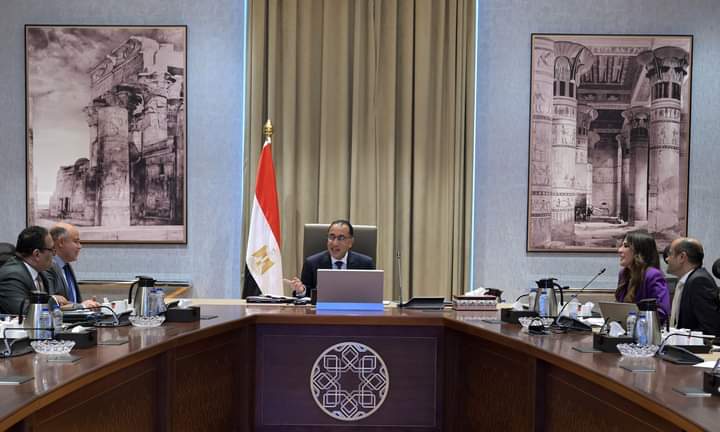
Prime Minister Dr. Moustafa Madbouly held a meeting on Tuesday to follow up efforts to develop the performance of the stock market. The meeting was attended by: Dr. Mohamed Farid Saleh, Chairman of the Financial Regulatory Authority, and Ahmed Al-Sheikh, Chairman of the Egyptian Stock Exchange.
The Prime Minister initiated the
meeting by emphasizing the significance of the Egyptian Stock Exchange's
development within the broader framework of the government's efforts to enhance
Egypt's investment climate. He underscored the exchange's crucial role as a
platform for financing and investment, particularly in light of the ongoing
government offerings program. By offering shares of state-owned companies on
the stock exchange, the government aims to attract increased foreign investment
through the securities market.
During the meeting, the Chairman
of the Egyptian Stock Exchange outlined the exchange's proactive approach to
addressing challenges. In September 2023, the exchange embarked on a strategic
development process involving community dialogue to identify and tackle key
issues. This collaborative effort culminated in the January 2024 release of the
"Egyptian Stock Exchange Board of Directors Development Strategy."
This comprehensive strategy outlines specific targets aimed at improving the
efficiency of the securities market through coordinated efforts with market
participants and relevant regulatory bodies, such as the Financial Regulatory
Authority.
The Chairman of the Exchange elaborated on the development strategy, emphasizing its foundation in extensive community dialogue with market participants. He highlighted the short- and medium-term nature of the strategy, which is designed to address the market's specific needs and priorities through seven key areas: developing the overall market framework, encouraging listings, developing listing rules for financial securities and instruments, developing markets and trading mechanisms, activating new markets and financial instruments, working to promote and disseminate financial culture, training, and strengthening international relations, and finally, enhancing the role of financial technology and integrating it into the exchange's operations.
Ahmed Sheikh further explained that the implementation of the strategy began promptly upon its approval, guided by a comprehensive work plan that aligns with market priorities, the needs of market participants, and a balanced approach to achieving high-quality results that positively impact the overall market system.
The meeting highlighted several significant executive steps implemented up to August 2024, most notably is the signing of a contract to replace the old trading system which has been in use since 2008. The new integrated system will support trading of all financial securities and instruments across multiple markets, adhering to the latest international standards. It was also noted that procedures are underway to modernize the trading surveillance system in line with international best practices.
Regarding market activity, the
Chairman noted that six new companies have been listed on the exchange since
the beginning of 2024, with trading already commencing for three of them.
Furthermore, four companies have transitioned from the small and medium-sized
enterprises market to the main market. The exchange aims to attract more large
companies and economic entities to list on the main market in the future.
The exchange also introduced the
EGX 33 Shariah Index, aimed at attracting new investor segments and offering a
valuable financial tool. This initiative has garnered significant interest from
various sectors of the capital market, with three of the largest fund
management companies expressing their intention to track their funds with the
EGX 33 Shariah Index.
Moreover, the exchange has
undertaken a comprehensive restructuring of its market divisions and linked
market lists to indices. This restructuring is designed to eliminate overlaps
between previously used markets and lists, thereby enhancing trading activity,
increasing liquidity, and deepening the market.
The meeting highlighted several other significant executive measures, including: amendment of the bidding unit: The bidding unit for shares has been revised to a percentage of the closing price to support market liquidity and trading rates; eEstablishment of an investor relations officer registry: A registry has been created for companies listed on the exchange, along with ongoing training and development plans to enhance their efficiency; facilitation of registration procedures: The exchange has streamlined the registration process for investment funds and foreign companies of all types, extending the validity period of their operating codes to align with Egyptian institutions; lLaunch of the African Voluntary Carbon Market: The necessary steps have been completed to launch this platform, and trading has commenced. The possibility of trading in International Renewable Energy Certificates (IRECs) is under consideration; reduction of the subscription period: A decision by the Prime Minister has amended Article 31 of the executive regulations of the Capital Market Law, reducing the subscription period for increasing company capital through the issuance of shares; strengthened communication: Efforts have been made to enhance communication with external parties, international financial institutions, and business organizations; promotion of financial culture: Continued efforts to promote and disseminate financial culture have included the fifth and sixth editions of the "Exchange Conference for Development" and the signing of cooperation protocols with Egyptian universities; and renovation of the historic trading hall: The exchange is renovating the historic trading hall to create a main center for conferences and meetings, incorporating the Egyptian Exchange Museum as a symbol of its long history.
Another significant executive step involved the preparation of a joint study with the General Authority for Investment and Free Zones to explore the potential linkage between expanded tax and investment incentives and listing on the Egyptian Stock Exchange.
In alignment with the objectives
outlined in the "Egyptian Exchange Board of Directors Development Strategy
- January 2024" and the exchange's commitment to institutionalized work
practices and ongoing engagement with market participants, the Egyptian Stock
Exchange has witnessed unprecedented historical peaks in various market
indicators from September 2023 to July 2024. These include the performance of
indices, trading values and volumes, and the number of executed transactions or
the number of clients. The main EGX30 index achieved its highest historical
peak, recording 33,383 points in the session of March 11, 2024. The market
capitalization also recorded its highest historical value at the end of the
session of March 10, 2024, reaching about 2.2 trillion Egyptian pounds.
At the same time, the session of
March 6, 2024 witnessed the highest daily trading value without deals and
without treasury bills, reaching 9.7 billion Egyptian pounds. The session of
February 25, 2024 also witnessed the execution of about 280,000 transactions,
and the highest daily number of clients in a single session of 49,966 clients.
In addition, the session of February 15, 2024 recorded the highest trading
volume without deals and without government debt instruments, as about 2.13
billion securities were traded.
During the period from September 2023 to July 2024, the total daily trading value across all securities, including deals and government debt instruments, reached approximately 11 trillion Egyptian pounds. This volume was supported by the execution of approximately 226 billion securities in around 26 million transactions.
